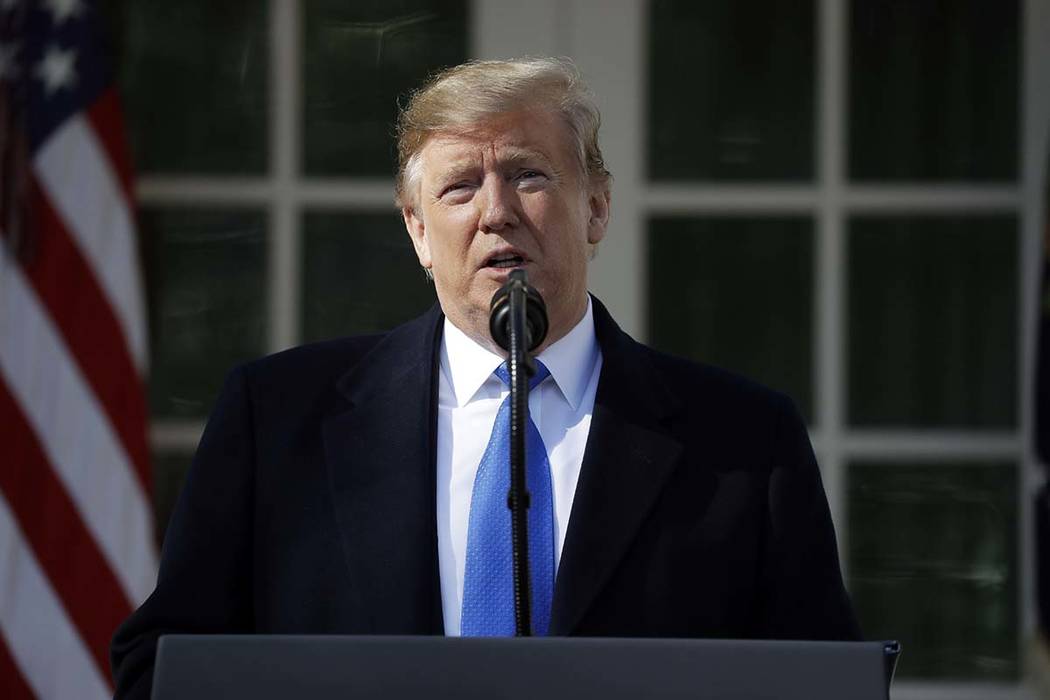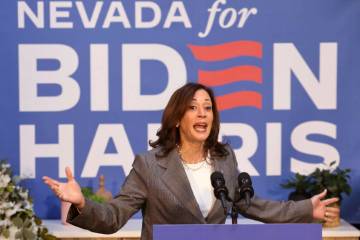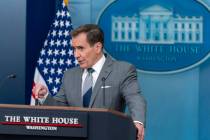Congress looks to override Trump on wall funding
WASHINGTON — House lawmakers will again lock horns with President Donald Trump this week over his declaration of a national emergency to redirect Pentagon funds from military construction projects — including $97 million in Nevada — to build a border wall.
As Congress returns from week-long district work period, the House will immediately take up a vote to override Trump’s veto of a resolution of disapproval that would terminate his national emergency declaration.
The resolution passed in the House and Senate with bipartisan support befor
e Trump vetoed it so he could access funds needed to build a wall on the Southwest border that Congress previously rejected.
Although Trump enjoys enough GOP support in the House to sustain the veto, Speaker Nancy Pelosi, D-Calif., has vowed to hold the veto override vote on Tuesday and put Republican lawmakers on record.
Many Republicans have backed the Democrats’ resolution, citing the president’s use of the emergency declaration to circumvent Congress and its constitutional role to direct and control federal spending.
“House Republicans will have to choose between their partisan hypocrisy and their sacred oath to support and defend the Constitution,” Pelosi said.
Pelosi needs a two-thirds majority needed to override the president, who is backed by the conservative House Freedom Caucus which supports his effort to build a wall along the U.S.-Mexico border.
Bipartisan majorities opposed resolution
The issue is likely to become fodder in 2020 congressional and presidential campaigns, with an overwhelming number of Republicans backing the president’s push to build a border wall that a majority of all voters in public opinion polling oppose.
Thirteen Republicans broke ranks and voted with Democrats on Feb. 26 to pass the resolution of disapproval of Trump’s national emergency declaration. It passed 245-182.
A Senate vote on March 14 saw 12 Republicans join Democrats to pass the resolution 59-41.
Most of the GOP senators who voted to pass the resolution over lobbying by the White House cited constitutional concerns and the separation of powers, not the president’s border security plans, as the reason for their vote.
Although the National Emergencies Act of 1976 has been used by every president since its passage, only Trump has used the law to circumvent Congress to obtain funds after the House and Senate rejected his demands, said Sen. Lamar Alexander, R-Tenn.
The House and Senate approved $1.375 billion for border fencing, technology and security measures passed earlier this year, but did not include $5.7 billion Trump specifically sought for border wall construction.
Military funds could build that wall
Trump declared a national emergency at the border after signing the spending bill, and the White House said it would redirect $3.6 billion in Pentagon funds for military construction and $3.1 billion in military and law enforcement drug interdiction funds to build portions of the wall.
Last week, the Pentagon sent the Senate a list of the military construction projects where funds could be diverted under the White House emergency.
That list includes $97 million in funding for projects at Creech AFB, Nellis AFB and a National Guard center in North Las Vegas.
“Now that members of Congress can see the potential impact this proposal could have on projects in their home states, I hope they will take that into consideration before the vote to override the president’s veto,” said Sen. Jack Reed, D-R.I., the ranking Democrat on the Senate Armed Services Committee.
The Nevada projects are all in the congressional district of Rep. Steven Horsford, a Democrat, who said the president’s emergency declaration is an “unconstitutional attack” on military service members on Nellis and Creech “performing missions that are critical to our national security.”
“They deserve our admiration and support, not cuts to funding to maintain their training, readiness and quality of life,” Horsford said.
Nevada’s congressional Democrats, Horsford, and Reps. Dina Titus and Susie Lee, voted to approve the resolution. The state’s lone Republican, Rep. Mark Amodei, vote against the resolution.
Both Democratic Sens. Catherine Cortez Masto and Jacky Rosen voted to approve the resolution of disapproval in the Senate.
The House would have to muster the two-thirds majority and override the president’s veto to send it to the Senate for a similar vote. That’s not likely to happen.
Freedom Caucus leader Rep. Mark Meadows, R-N.C., and other conservatives in the House, argue that the president’s action on the border is legal and within the law as written.
Meadows said lawmakers can argue whether it should be legal, and whether Congress should permanently rein in executive power, but until then, the president is right to address the situation at the border.
Even if the vote to override fails, as is largely expected, Pelosi said the law also allows for Congress to continually review a presidential emergency declaration.
She said the House would likely vote again in six months on a resolution of disapproval of the Trump border emergency if it still stands.
Meanwhile, the declaration faces legal hurdles as well. There are 16 states, including Nevada, which have filed a lawsuit in federal court in California seeking an injunction to stop the president from redirecting Pentagon funding to the border wall.
Lawsuits filed on behalf of landowners in Texas have also been filed, seeking a halt to federal government efforts to acquire property in the United States near the Rio Grande to build portions of the border wall.
Trump, earlier this month, predicted that lower courts would likely rule against him, but that he would be successful in appeals, a process likely to take months, if not years.
Contact Gary Martin at gmartin@reviewjournal.com or 202-662-7390. Follow @garymartindc on Twitter.





























